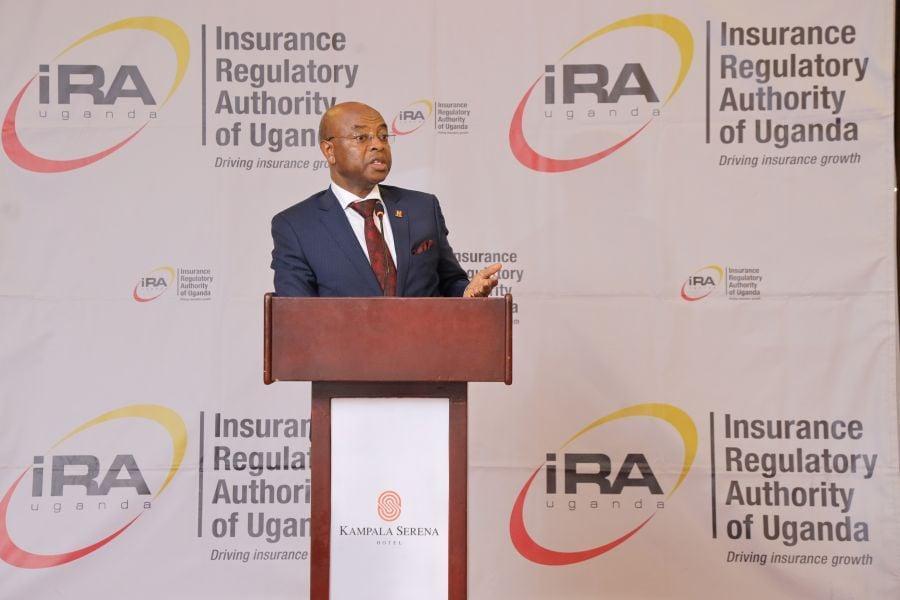Africa-Press – Uganda. A new survey sanctioned by the Uganda Insurers Association(UIA) has indicated that despite efforts to increase uptake, most Ugandans are still ignorant about the concept of insurance
The outcome of the survey on public perception about insurance conducted by Reev Consult Limited and Fireworks Advertising Uganda unveiled during the 63rd CEOs breakfast meeting by the Insurance Regulatory Authority at Kampala Serena Hotel indicated that a number of Ugandans think that insurance is irrelevant.
“Close to 50% say insurance is for the rich while more than 70% say premium is “lost” money because there is no refund and money for one year cannot be carried forward to the next. Others say the process of claiming compensation is too long and frustrating,” the survey says.
According to the deputy governor of the Bank of Uganda, Prof. Augustus Nuwagaba who was part of the team that carried out the survey said there is still a lot of mistrust of insurance companies to pay claims.
“It is appalling that insurance companies conduct business and the people are not trusting them. This is bad news. The people are saying the cost of meeting insurance are very high,” Prof Nuwagaba said.
Quoting the survey, the deputy BoU governor said insurance companies have not educated people about the benefits of insurance while operational approaches have been too profit-oriented focusing on existing market with little, if any effort, to explore new markets.
“Similarly, innovativeness regarding product range to create new demand, has been very limited. The public is saying that there is mis-selling of insurance policies where insurance companies deliberately hold back critical information to potential clients only to surface at compensation,” he said.
Challenges for insurers
The survey on the other side indicated that there is government disinterest in insurance sector and has not been supportive.
“Insurance companies in Uganda are purely private businesses with little, if any, support from government. This explains why companies prefer to locate and operate from big towns and cities over the small towns and rural locations.”
“Cultural, religious and traditional belief systems; some cultural and religious beliefs have influenced individuals’ attitudes towards insurance, leading to skepticism or outright rejection of formal insurance. Emergence of community based social safety schemes and support systems that are akin to informal insurance.”
According to prof. Nuwagaba, all these end up denting the image of the insurance leading to low levels of penetration, currently at 0.8%
He however urged insurers to embark on intensive sensitization using diverse channels that may include; community outreaches, campaigns, advertising, among others.
“You must sensitize the population on the need for saving, investment and risk management, notwithstanding the power of God that surpasses human understanding. There ought to be strong deliberate interventions, preferably government led, to build trust in insurance processes, justice system institutions and service delivery in general,” Prof. Nuwagaba said.
“Insurers must “clean up their act” so that potential clients build trust in them as service-oriented, before they can entrust their money to them. The actors; insurance companies, agents, blockers, etc. must aim at “uprightness” to gain and sustain trust of their clients, real and potential.”
He said it is high time insurers strengthened customer care services to address bureaucracy, consider splitting insurance premium into smaller manageable installments to ease the strain of one-off settlement on clients, especially the low-income clients but also lobby government for support.
Commenting about the outcome of the survey, Insurance Regulatory Authority CEO,Al Haj Ibrahim Kaddunabbi Lubega said a number of the issues mentioned in the survey have been worked on.
“However, many of them need to be improved so that we can register milestones which can talk to where we want to go. I know from the engagements I have had with players; they are more than willing to change but this might not be as fast as we wanted it,” Kaddunabbi said.
He urged mainstream government to change on how it perceives insurance and its contribution to the bigger economy.
“I know when ambassadors increase, many people will start appreciating the value of insurance to the economic development of the country.”
He said insurance companies are working on splitting insurance premiums into smaller installments.
The Chief Executive Officer at Uganda Insurers’ Association, Jonan Kisakye said there has been commendable growth in terms of insurance penetration in the country.
“Over the longest period of time, insurance penetration has been oscillating between 0.5% and 0.8%. The insurance industry over that period of time again has grown from like shs90 billion in 2005 to now about shs1.6 trillion. There are efforts which have been made towards this growth,” Kisakye said.
He noted that when it comes to sensitization of the public, every year, UIA spends shs2 billion , noting that despite sensitization, there is still a big challenge.
“Money is pent by the UIA and the regulator also spends a lot but we don’t see these numbers move. What we believe is that the insurance industry has something it is not doing right in the sensitization. We have therefore come up with an initiative named the Insurance Literacy and Market Development agenda. We are moving a step ahead from research and recommendations into implementation.”
“The survey has been conducted and we know where the problems are. We now need to engage stakeholders like government, informal sector and everyone. We must come up with appropriate intervention for each of those segments.The next step is for us to go into the engagement initiatives with stakeholders to put recommendations into practice. This time we have come together as an industry.”
For More News And Analysis About Uganda Follow Africa-Press






